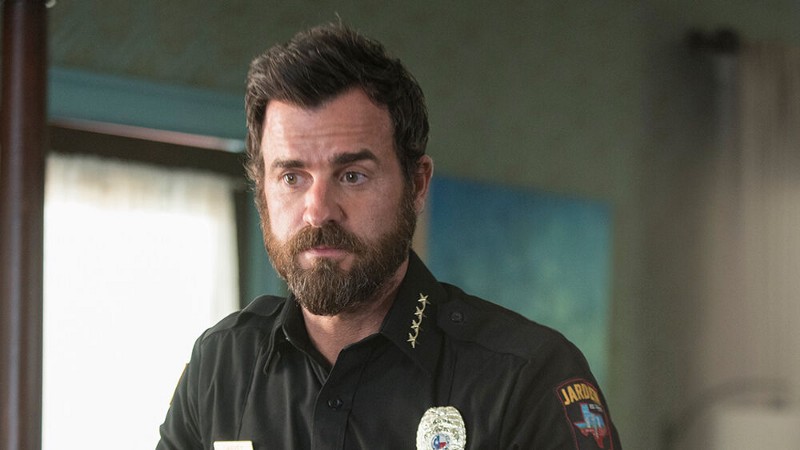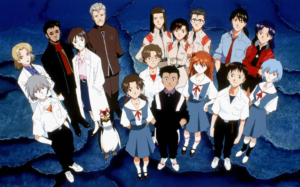Men Do Cry

Courtesy of The Leftovers Wiki
Written By Austin Hall (@ADWAustin)
There’s a scene in Wolfenstein II: The New Colossus, a new installment of an 80s game that sees you fight Hitler in a mech suit, that always sticks out to me.
Our hero, a hulking Aryan-looking man of Jewish ethnicity, is sitting on the floor, his head and arms in his mother’s lap as she caresses and comforts him much in the way she would if he were little. He is completely distraught that this isn’t real, that she’s actually dead thanks to Nazis, that he may be on his own way out, and everything could be over for him and his friends. You have to understand something: this game started out as a first-person shooter (FPS) where you fight Hitler in a mech suit. Even the difficulty menu of the new games show the hero’s face with a pacifier in his mouth for easy and an enraged lunatic with blood smeared on his face for its hardest level. It’s the most macho game I’ve ever played and that includes the Call of Duty (CoD) games. Frankly, the blood and gore is flirting with slasher movie grossness. And yet, in a pivotal scene, this muscle-bound man is being comforted by his mother. He shows flashes of his vulnerability and love for people throughout the franchise’s recent installments, but it’s still striking to see and the reason I fell in love with the franchise.https://www.youtube.com/embed/5ys2KitPyUM?feature=oembed
It isn’t just a FPS where you mash buttons to slaughter Nazis. It’s a linear narrative about a man who has lost so much and still has so much to lose as he fights evil. Though he easily dispatches enemies so well he’s called “Terror-Billy”, he falls in love, finds companionship, and even forms a tight bond with a motherly figure all on his way to having twins. This is what separates the franchise from most FPS games, even though, I must admit, CoD has elements of this.
In this new cultural zeitgeist of redefining what it means to be a man by deciding what traits are toxic and what aren’t, you’ll find examples all over modern pop culture.
The Leftovers is another. A three-season HBO show that ended in 2017 based on the novel of the same name had a simple premise: what if the rapture happened without the fire and brimstone? What if people just disappeared and that was that?
It starred Kevin Garvey, who starts out as the chief of police in a suburban New York town because his Dad started hearing voices.
Kevin breeds what some might call toxic masculinity because of his bouts of violent anger and destruction, but at his core, he is an emotional and vulnerable person who cries often. In fact, I’ve never seen a man that masculine cry that much in a show, and it’s quite striking to see today when the media of my childhood would never portray a man this way. That’s what made Kevin so intriguing, so different. In each scene, you were drawn to his every move.https://giphy.com/embed/tYsE0UgOcMEXm/twitter/iframeCourtesy of GIPHY
The thing is, showing stereotypically muscular men in vulnerable roles isn’t entirely new.
The Matrix was thought of as a gender-bending movie where the main female and male protagonists both displayed qualities associated with stereotypical “gender roles”. In the video game Red Dead Redemption (RDR), a rugged outlaw has a loving wife and son. Even in the Marvel Cinematic Universe, Tony Stark, aka Iron Man, starts out as a billionaire playboy but becomes a family man who hugs Spider-Man in the end before sacrificing himself. Each one of these examples seemed to subvert a trope of a typical man’s man that actually had a loving side to them. John Marston, the main character of RDR, loved his wife and kid so much that he sacrificed himself to aid in their escape, much in the same way that Stark did. You don’t expect it, but it’s quite a payoff when it happens.
Each of these male characters display outwardly aggressive bravado that we’ve been seeing since the days of John Wayne, but what’s also at the forefront is emotional turmoil that makes each character complex and interesting. In this era of shifting gender roles and identity, this needs to continue to be explored much in the way it was explored in the examples above.
As we continue to reassess what masculinity even means, these stories give us an idea of what it could be, and in this case, what it should be. Maybe, someday, it won’t be a subverted trope, twist ending, or character development; maybe someday it’ll just be expected. Maybe, someday, there won’t be any gender tropes left to explore, and people can just be people.
Want to keep up with PubSquare Media? Follow us on Facebook, Twitter, and Instagram!



